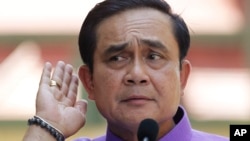Thailand's King is expected to give permission for an end to months of martial law in the country. But many in Bangkok, including legal experts and defenders of human rights, are not viewing this as cause for celebration.
They are warning martial law is being replaced with the application of a section of a provisional charter that will give the leader of the kingdom's junta even more power.
Thailand's National Human Rights Commission, which is not known for taking bold stands, is bluntly warning that revoking martial law and applying Article 44 of the interim charter, which replaced the constitution after the May 22 coup, will give Prime Minister Prayuth Chan-ocha absolute authority.
Sunai Phasuk, the senior researcher in Thailand for the international organization Human Rights Watch, agrees.
“That will allow General Prayuth, prime minister and the junta leader, to consolidate powers in his hand to the point that he can order anyone to do or not to do anything. He has ultimate powers now, unlimited, unchecked. And his actions can be done with total impunity,” said Sunai.
Former army chief Prayuth, who seized control of the government in a coup nearly ten months ago, promises to utilize his sweeping powers responsibly, saying those who have not done “anything wrong” have no need to be afraid. However he bluntly warned that “if there is any shooting and causing of chaos again, I will order arrests immediately.”
Sunai said regardless of the prime minister's assurances to act responsibly, his organization cannot see how application of the interim charter can lead to any improvement in the rights situation in Thailand.
“Under section 44 orders will be issued to allow the military to arrest and detain dissidents, put them incommunicado [in] military detention for at least seven days. That is no different than the ongoing situation under martial law,” he said.
Thailand has come under pressure from the diplomatic community to end martial law, imposed two days prior to the coup.
Officials of the junta-led government insist the controversial article in the interim charter will only be used to urgently solve national problems without violating human rights.
Last year's military takeover - the latest in a long series of such coups - came following a period of sometimes violent street protests, mainly by opponents of the elected government.
The junta has vowed to permanently eradicate the influence from Thai politics of the Shinawatra clan, which has backed the victors of every election since 2001.
Both Thaksin Shinawatra, in 2006, and his sister Yingluck Shinawatra, last year, were forced from office.
Thaksin is in self-imposed exile due to a corruption conviction in 2008. Yingluck is currently facing criminal charges.
Their supporters say the legal cases against the family members are political.
Analysts view the latest coup as timed to ensure that the military will have a tight grip on Thailand to prevent chaos during the approaching period of royal transition.
The widely-revered monarch, King Bhumibol, is 87 years old and has been in poor health for years. His son and heir apparent, Crown Prince Vajiralongkorn, does not garner the same level of admiration his father has enjoyed.




